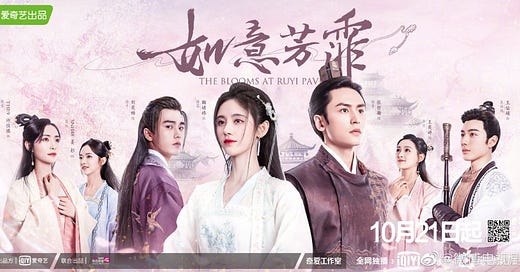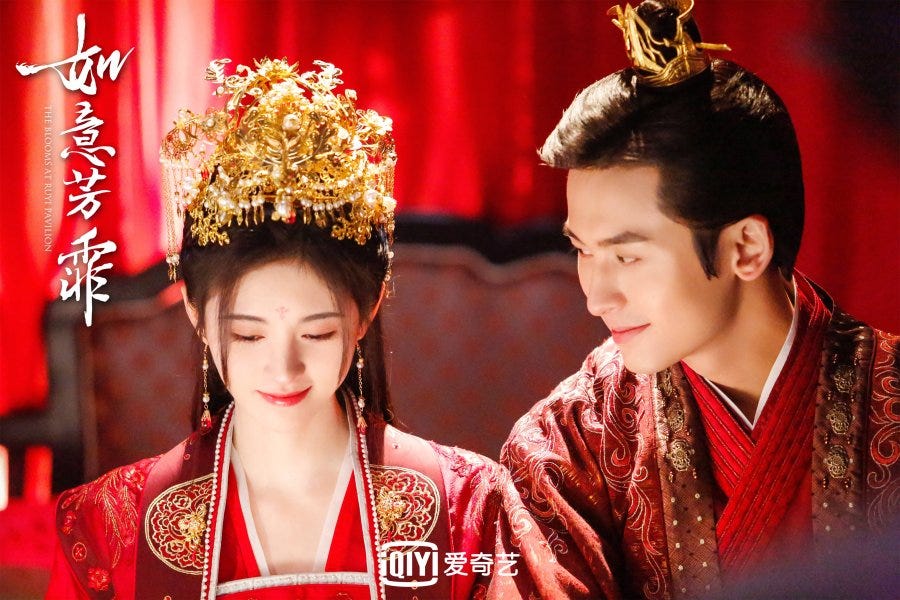So I’m a little bored and lamenting the damage done to Zhang Zhehan’s acting career although his singing gigs seem to be taking off. I turn my attention to this 3-year-old drama hankering for the Yunxi pairing of Ju Jingyi and Zhang Zhehan. Viki has done a generally decent translation of the series with the odd inexplicable mistake here and there. At least I am placated by the decent translations of the aristocratic titles.
3 years later, Ruyi Pavilion is still a fun watch as a whole despite all the contrivances and conveniences that become rather glaring in the final act when they’re rushing at breakneck speed to give the leads their happily-ever-after. All the issues I had with it when it first aired haven’t magically disappeared with a second appraisal but as a show about fated love, it does check the right boxes. C dramas suffer terribly from editing and censorship, and if the rumours about the slated 48 episodes are true then some of the plot holes are accounted for. Like the Legend of Yunxi it has a deus ex machina ending although not as objectionable as its predecessor. Also by the time one collapses in exhaustion with the melodramatic push and pull, even an overdone happy ending is a relief at the end of a dimly lit tunnel.
My biggest beef with the show then and now is the show’s primary antagonist, Xu Ping aka Prince An (Liu Yichang). His piggy-backed schemes while not top-tier drive much of the marriage plot in helpful ways. What’s really embarrassing are his motivations — weak and idiotic — and has me pleading for a vanilla “I want to rule the world” villain at the end. Linking his revenge story to his allegedly dead mother is not the wisest course of action especially if the show is keen to depict him as a sympathetic if misguided figure who isn’t “born evil” but a child that misses his mother. As an Iago type character meddling and whispering doubts, he offers much scope for contemplation but as a kid with attachment issues and no clue about what happened, he’s not only a laughingstock when all is revealed but inadvertently proves himself to be “evil incarnate” because of the consequences of his vengeful disposition. Frankly jealousy (though commonplace) would make for a more compelling justification for the emperor’s brother to unleash the worst parts of himself.
Xu Ping’s ire is directed largely at Xu Jin or Prince Su (Zhang Zhehan), his nephew who as a boy was sent to a temple as a disciplinary measure. Apparently the young prince accidentally starts a fire and Consort Wen dies as a result. Or so Xu Ping thinks. His paranoia leads him to believe that what ensues — Xu Jin’s “banishment” to the border is a cover-up of his mother’s death by the emperor. For a man with immense resources to wreak quite a bit of havoc, he fails at the most fundamental level — to investigate what really happened to his mother on the day of her demise. If the good people at Ruyi Pavilion can get to the bottom of that mystery with relative ease in a matter of hours, Xu Ping comes across as a pathetic fool directing his resources at the wrong end of the stick.
Worse still he has managed to talk himself into believing that his childhood affection for Fu Rong, our protagonist (Ju Jingyi), is steadfast. In his warped mind, only he understands her and what she needs. His desire to separate the show’s main romance stems from a fixation and delusion rooted in the past. His knowledge of her in the present is based on brief observations and the odd rants. He is a man with a jigsaw puzzle with only a third or quarter of the pieces trying to make sense of a relationship that’s largely a work-in-progress. Furthermore without the currency of trust that largely undeserved, he would never have gotten away with as much as he did. His reputation as a scholar allows him to act undetected by his closest relatives. Xu Jin might jealous of his uncle at times, but it never occurs to him that his uncle would be trying to kill him or undermine the stability of the royal court.
Whatever deficiencies Prince An presents as an antagonist (and he’s not the only one), this show is ultimately not a historical drama steep in palace politics. There’s actually very little of that going on. Stripped of all the fancy apparel, it’s a family melodrama about the problems wealthy families which are the stuff of soap operas. The head of the household recalls his most capable trustworthy son from his duties in a distant place to do a bit “house cleaning” in the family business beginning with the tightening of security measures. As he digs around he discovers a web of embezzlement that begins with his own family and a mysterious information broker known as Ruyi. As a son who also didn’t grow up with his birth mother, Xu Jin gradually reconnects with her through various events. Meanwhile in the course of his investigation he gradually falls for an inquisitive and lively young daughter of a public servant who becomes his wife under false pretences. His dad doesn’t approve of his choice and is even more adamantly against the match when rumours that she tried to give him the knife make the rounds. Of course it’s absolutely ridiculous that a lass with no martial arts experience tries to stab him in the chest instead of poisoning him. It’s equally silly that Prince An who claims to care about her freedom most puts her up to such a dangerous and foolhardy mission when there are easier and more efficient ways to go about it. One gets the feeling that nobody takes this assassination business seriously at all.
Nevertheless the experience is addictive because the push and pull is insanely relentless. How Fu Rong tries to kill Xu Jin is really an afterthought for the fact that the trust between them is paper thin at the start. All his passion for her is not enough to overcome the doubts she has about his integrity when there are a barrage of intrusions coming from all directions. Furthermore it doesn’t help too that he often withholds information from her in an act of noble idiocy to protect her. At times he is not only the subject of serious misunderstanding, but is willing to go along with playing “the bad guy” and fan the flames if it means she’s tucked away safely from all the brouhaha.
The entire drama charts the process of marriage between Fu Rong and Xu Jin. The duo are expected to navigate the trials and temptations with of talk of divorce sprinkled all throughout. Divorce is meant to manipulate the other; it’s a bargaining tool; it’s an escape hatch; it’s a test of the leads’ devotion to each other. In normal life it doesn’t bode well for the relationship’s longevity but in a high conflict drama like this, it is a case of “Jump? Tell me how high.”
Then there are the premonitions that are supposed to be the reasons why Fu Rong often foolishly rush in heart first to “change her fate”. They do their mighty best to put the fear of God in her. They seem to disappear from the narrative into oblivion in record time. She’s seen Xu Jin her dreams as her future husband but she’s his lesser concubine much bullied by the more insufferable screechy commandery princess Cui Wan. The prospect of living under such conditions is unappealing and when we meet Cui Wan, it’s not hard to see why Fu Rong is being such an inveterate busybody.
The Blooms at Ruyi Pavillion is not a great drama by any metric with plenty of plot holes to stick one’s fingers through but it is an entertaining light watch with a nice mix of humour and conflict to keep one reaching for the nuts. And the dark chocolate.





I was not able to get into this, after trying her series with ZZH too in LEGEND OF YUNXI. I struggled and figured this just felt very similar. Did you watch LEGEND OF YUNXI?